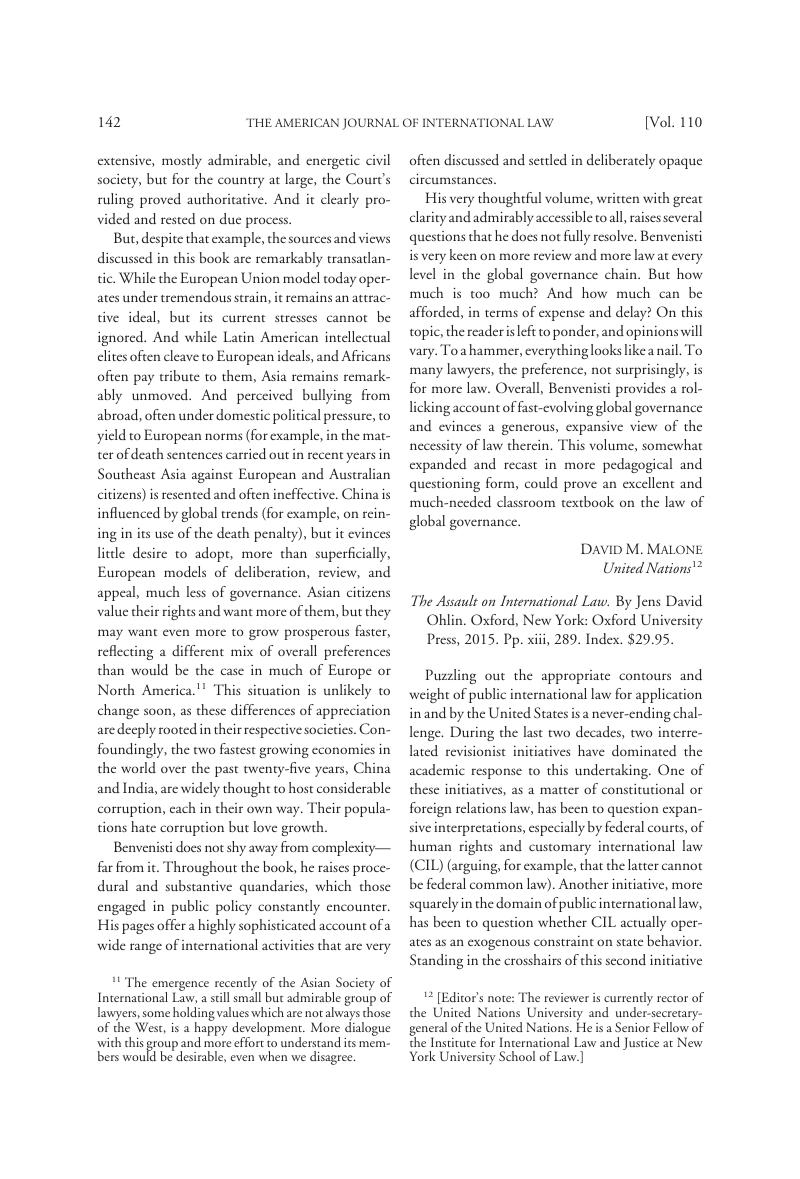No CrossRef data available.
Article contents
The Assault on International Law. By Jens David Ohlin. Oxford, New York: Oxford University Press, 2015. Pp. xiii, 289. Index. $29.95.
Published online by Cambridge University Press: 20 January 2017
Abstract

- Type
- Recent Books on International Law
- Information
- Copyright
- Copyright © American Society of International Law 2016
References
1 Jack L. Goldsmith & Eric A. Posner, The Limits of International Law (2005). The coauthors have elsewhere described their book as follows:
The Limits of International Law sets forth a general theory of international law. The book rejects the traditional explanations of international law based on legality, morality, opinio juris, and related non-instrumental concepts. Using simple rational choice tools, the book seeks instead to provide an instrumental account of when and why nations use international law, when and why they comply with it, and when and why international law changes. The basic descriptive storyis that international law emerges from and is sustained by nations acting rationally to maximize their interests (i.e., their preferences over international relations outcomes), given their perception of the interests of other states, and the distribution of state power. Limits also makes two normative arguments: nations have no moral obligation to comply with international law, and liberal democratic nations have no duty to engage in the strong cosmopolitan actions so often demanded of them.
Goldsmith, Jack & Posner, Eric A., The New International Law Scholarship, 34 GA. J. Int’l & Comp. L. 463, 463 (2006)Google Scholar (footnote omitted) (in response to extensive commentary on their book in Symposium: The Limits of International Law, 34 GA. J. Int’l & Comp. L. 253–484 (2006)).
2 E.g., The Paquete Habana, 175 U.S. 677, 700 (1900).
3 See Erica Posner, The Twilight of Human Rights Law 143 (2014) (stating, at least in the context of human rights law, that “[l]awyers mainly read and discuss judicial opinions— which hardly affect anyone at all —while ignoring the actual behavior of governments, NGOs, and individuals” (emphasis added)).
4 The sharp focus on these few scholars should not, however, obscure the precursors—let’s call them the Old Realists—in political science (especially the realist guru, Hans Morgenthau, to whom Ohlin pays respect, but also Jeane Kirkpatrick and others), theology (for example, Reinhold Niebuhr), and law (for example, Phillip Trimble, Mark Weisburd, and Michael Glennon).
5 Legality of the Threat or Use of Nuclear Weapons, Advisory Opinion, 1996 ICJ Rep. 226, 328 (July 8) (Schwebel, J., dissenting).
6 Bradford, Anu & Posner, Eric A., Universal Exceptionalism in International Law, 52 Harv. Int’l L.J. 1, 54 (2011)Google Scholar.
7 See, e.g., Stephen Breyer, The Court and the World: American Law and the New Global Realities 6, 249–51 (2015).
8 See, e.g., Michael P. Scharf & Paul R. Williams, Shaping Foreign Policy in Times of Crisis: The Role of International Law and the State Department Legal Adviser passim (2010) (citing evidence that recent legal advisers of the U.S. Department of State argued successfully for compliance with international law, for example, to govern the detention of Al Qaeda and Taliban detainees under the 1949 Geneva Convention on prisoners of war).


